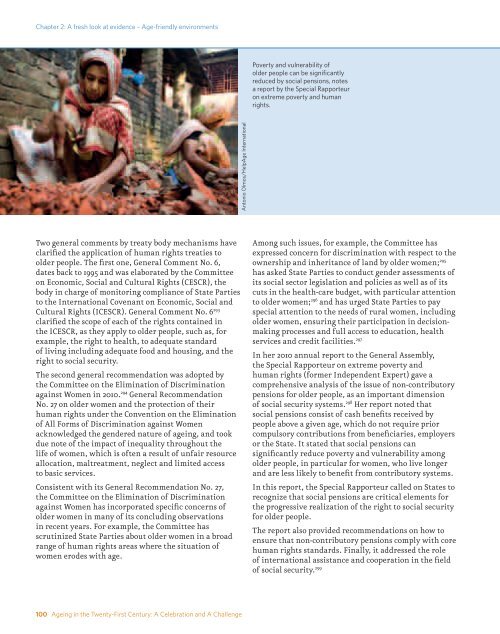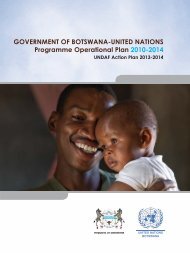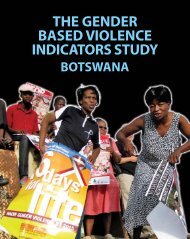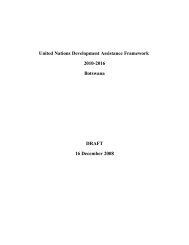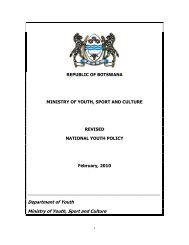Ageing in the Twenty-First Century: - HelpAge International
Ageing in the Twenty-First Century: - HelpAge International
Ageing in the Twenty-First Century: - HelpAge International
You also want an ePaper? Increase the reach of your titles
YUMPU automatically turns print PDFs into web optimized ePapers that Google loves.
Chapter 2: A fresh look at evidence – Age-friendly environments<br />
Poverty and vulnerability of<br />
older people can be significantly<br />
reduced by social pensions, notes<br />
a report by <strong>the</strong> Special Rapporteur<br />
on extreme poverty and human<br />
rights.<br />
Antonio Olmos/<strong>HelpAge</strong> <strong>International</strong><br />
Two general comments by treaty body mechanisms have<br />
clarified <strong>the</strong> application of human rights treaties to<br />
older people. The first one, General Comment No. 6,<br />
dates back to 1995 and was elaborated by <strong>the</strong> Committee<br />
on Economic, Social and Cultural Rights (CESCR), <strong>the</strong><br />
body <strong>in</strong> charge of monitor<strong>in</strong>g compliance of State Parties<br />
to <strong>the</strong> <strong>International</strong> Covenant on Economic, Social and<br />
Cultural Rights (ICESCR). General Comment No. 6 293<br />
clarified <strong>the</strong> scope of each of <strong>the</strong> rights conta<strong>in</strong>ed <strong>in</strong><br />
<strong>the</strong> ICESCR, as <strong>the</strong>y apply to older people, such as, for<br />
example, <strong>the</strong> right to health, to adequate standard<br />
of liv<strong>in</strong>g <strong>in</strong>clud<strong>in</strong>g adequate food and hous<strong>in</strong>g, and <strong>the</strong><br />
right to social security.<br />
The second general recommendation was adopted by<br />
<strong>the</strong> Committee on <strong>the</strong> Elim<strong>in</strong>ation of Discrim<strong>in</strong>ation<br />
aga<strong>in</strong>st Women <strong>in</strong> 2010. 294 General Recommendation<br />
No. 27 on older women and <strong>the</strong> protection of <strong>the</strong>ir<br />
human rights under <strong>the</strong> Convention on <strong>the</strong> Elim<strong>in</strong>ation<br />
of All Forms of Discrim<strong>in</strong>ation aga<strong>in</strong>st Women<br />
acknowledged <strong>the</strong> gendered nature of age<strong>in</strong>g, and took<br />
due note of <strong>the</strong> impact of <strong>in</strong>equality throughout <strong>the</strong><br />
life of women, which is often a result of unfair resource<br />
allocation, maltreatment, neglect and limited access<br />
to basic services.<br />
Consistent with its General Recommendation No. 27,<br />
<strong>the</strong> Committee on <strong>the</strong> Elim<strong>in</strong>ation of Discrim<strong>in</strong>ation<br />
aga<strong>in</strong>st Women has <strong>in</strong>corporated specific concerns of<br />
older women <strong>in</strong> many of its conclud<strong>in</strong>g observations<br />
<strong>in</strong> recent years. For example, <strong>the</strong> Committee has<br />
scrut<strong>in</strong>ized State Parties about older women <strong>in</strong> a broad<br />
range of human rights areas where <strong>the</strong> situation of<br />
women erodes with age.<br />
Among such issues, for example, <strong>the</strong> Committee has<br />
expressed concern for discrim<strong>in</strong>ation with respect to <strong>the</strong><br />
ownership and <strong>in</strong>heritance of land by older women; 295<br />
has asked State Parties to conduct gender assessments of<br />
its social sector legislation and policies as well as of its<br />
cuts <strong>in</strong> <strong>the</strong> health-care budget, with particular attention<br />
to older women; 296 and has urged State Parties to pay<br />
special attention to <strong>the</strong> needs of rural women, <strong>in</strong>clud<strong>in</strong>g<br />
older women, ensur<strong>in</strong>g <strong>the</strong>ir participation <strong>in</strong> decisionmak<strong>in</strong>g<br />
processes and full access to education, health<br />
services and credit facilities. 297<br />
In her 2010 annual report to <strong>the</strong> General Assembly,<br />
<strong>the</strong> Special Rapporteur on extreme poverty and<br />
human rights (former Independent Expert) gave a<br />
comprehensive analysis of <strong>the</strong> issue of non-contributory<br />
pensions for older people, as an important dimension<br />
of social security systems. 298 Her report noted that<br />
social pensions consist of cash benefits received by<br />
people above a given age, which do not require prior<br />
compulsory contributions from beneficiaries, employers<br />
or <strong>the</strong> State. It stated that social pensions can<br />
significantly reduce poverty and vulnerability among<br />
older people, <strong>in</strong> particular for women, who live longer<br />
and are less likely to benefit from contributory systems.<br />
In this report, <strong>the</strong> Special Rapporteur called on States to<br />
recognize that social pensions are critical elements for<br />
<strong>the</strong> progressive realization of <strong>the</strong> right to social security<br />
for older people.<br />
The report also provided recommendations on how to<br />
ensure that non-contributory pensions comply with core<br />
human rights standards. F<strong>in</strong>ally, it addressed <strong>the</strong> role<br />
of <strong>in</strong>ternational assistance and cooperation <strong>in</strong> <strong>the</strong> field<br />
of social security. 299<br />
100 <strong>Age<strong>in</strong>g</strong> <strong>in</strong> <strong>the</strong> <strong>Twenty</strong>-<strong>First</strong> <strong>Century</strong>: A Celebration and A Challenge


